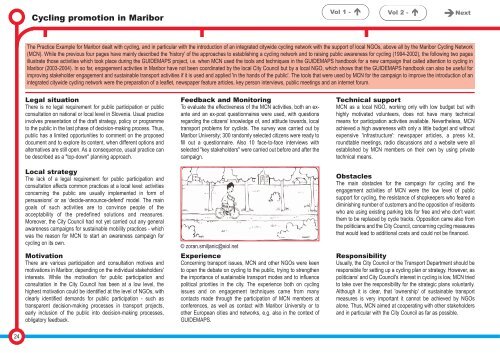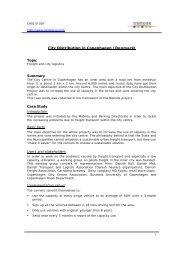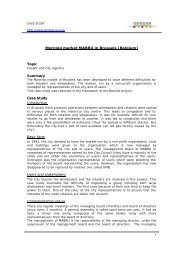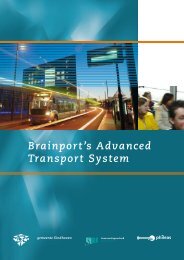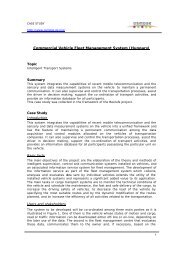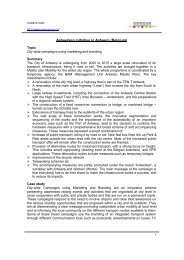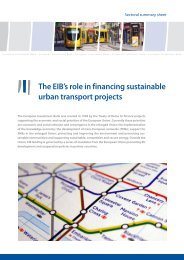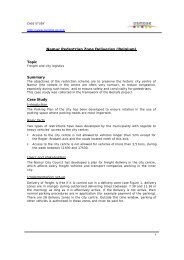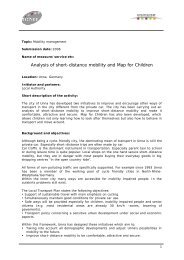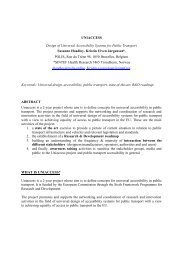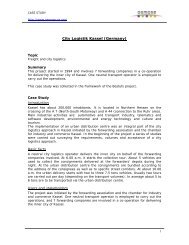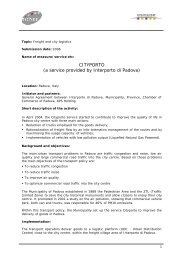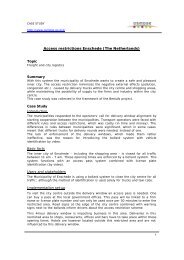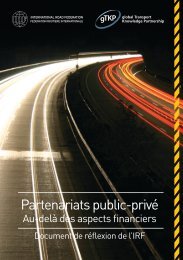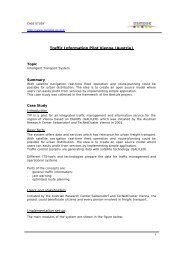Successful transport decision-making - Osmose
Successful transport decision-making - Osmose
Successful transport decision-making - Osmose
Create successful ePaper yourself
Turn your PDF publications into a flip-book with our unique Google optimized e-Paper software.
Cycling promotion in Maribor<br />
Vol 1 - !<br />
Vol 2 - !<br />
" Next<br />
The Practice Example for Maribor dealt with cycling, and in particular with the introduction of an integrated citywide cycling network with the support of local NGOs, above all by the Maribor Cycling Network<br />
(MCN). While the previous four pages have mainly described the 'history' of the approaches to establishing a cycling network and to raising public awareness for cycling (1994-2002), the following two pages<br />
illustrate those activities which took place during the GUIDEMAPS project, i.e. when MCN used the tools and techniques in the GUIDEMAPS handbook for a new campaign that called attention to cycling in<br />
Maribor (2003-2004). In so far, engagement activities in Maribor have not been coordinated by the local City Council but by a local NGO, which shows that the GUIDEMAPS handbook can also be useful for<br />
improving stakeholder engagement and sustainable <strong>transport</strong> activities if it is used and applied 'in the hands of the public'. The tools that were used by MCN for the campaign to improve the introduction of an<br />
integrated citywide cycling network were the preparation of a leaflet, newspaper feature articles, key person interviews, public meetings and an internet forum.<br />
Legal situation<br />
There is no legal requirement for public participation or public<br />
consultation on national or local level in Slovenia. Usual practice<br />
involves presentation of the draft strategy, policy or programme<br />
to the public in the last phase of <strong>decision</strong>-<strong>making</strong> process. Thus,<br />
public has a limited opportunities to comment on the proposed<br />
document and to explore its content, when different options and<br />
alternatives are still open. As a consequence, usual practice can<br />
be described as a "top-down" planning approach.<br />
Local strategy<br />
The lack of a legal requirement for public participation and<br />
consultation affects common practices at a local level: activities<br />
concerning the public are usually implemented in form of<br />
persuasions' or as ‘decide-announce-defend' model. The main<br />
goals of such activities are to convince people of the<br />
acceptability of the predefined solutions and measures.<br />
Moreover, the City Council had not yet carried out any general<br />
awareness campaigns for sustainable mobility practices - which<br />
was the reason for MCN to start an awareness campaign for<br />
cycling on its own.<br />
Motivation<br />
There are various participation and consultation motives and<br />
motivations in Maribor, depending on the individual stakeholders'<br />
interests. While the motivation for public participation and<br />
consultation in the City Council has been at a low level, the<br />
highest motivation could be identified at the level of NGOs, with<br />
clearly identified demands for public participation - such as<br />
transparent <strong>decision</strong>-<strong>making</strong> processes in <strong>transport</strong> projects,<br />
early inclusion of the public into <strong>decision</strong>-<strong>making</strong> processes,<br />
obligatory feedback.<br />
Feedback and Monitoring<br />
To evaluate the effectiveness of the MCN activities, both an exante<br />
and an ex-post questionnaires were used, with questions<br />
regarding the citizens' knowledge of, and attitude towards, local<br />
<strong>transport</strong> problems for cyclists. The survey was carried out by<br />
Maribor University; 300 randomly selected citizens were ready to<br />
fill out a questionnaire. Also 10 face-to-face interviews with<br />
selected "key stakeholders" were carried out before and after the<br />
campaign.<br />
© zoran.smiljanic@siol.net<br />
Experience<br />
Concerning <strong>transport</strong> issues, MCN and other NGOs were keen<br />
to open the debate on cycling to the public, trying to strengthen<br />
the importance of sustainable <strong>transport</strong> modes and to influence<br />
political priorities in the city. The experience both on cycling<br />
issues and on engagement techniques came from many<br />
contacts made through the participation of MCN members at<br />
conferences, as well as contact with Maribor University or to<br />
other European cities and networks, e.g. also in the context of<br />
GUIDEMAPS.<br />
Technical support<br />
MCN as a local NGO, working only with low budget but with<br />
highly motivated volunteers, does not have many technical<br />
means for participation activities available. Nevertheless, MCN<br />
achieved a high awareness with only a little budget and without<br />
expensive 'infrastructure': newspaper articles, a press kit,<br />
roundtable meetings, radio discussions and a website were all<br />
established by MCN members on their own by using private<br />
technical means.<br />
Obstacles<br />
The main obstacles for the campaign for cycling and the<br />
engagement activities of MCN were the low level of public<br />
support for cycling, the resistance of shopkeepers who feared a<br />
diminishing number of customers and the opposition of residents<br />
who are using existing parking lots for free and who don't want<br />
them to be replaced by cycle tracks. Opposition came also from<br />
the politicians and the City Council, concerning cycling measures<br />
that would lead to additional costs and could not be financed.<br />
Responsibility<br />
Usually, the City Council or the Transport Department should be<br />
responsible for setting up a cycling plan or strategy. However, as<br />
politicians' and City Council's interest in cycling is low, MCN tried<br />
to take over the responsibility for the strategic plans voluntarily.<br />
Although it is clear, that 'ownership' of sustainable <strong>transport</strong><br />
measures is very important it cannot be achieved by NGOs<br />
alone. Thus, MCN aimed at cooperating with other stakeholders<br />
and in particular with the City Council as far as possible.<br />
24


